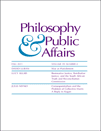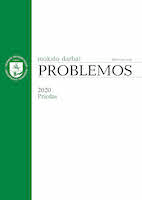
Humana Mente-Journal of Philosophical Studies
Scope & Guideline
Catalyzing Scholarly Dialogue in Contemporary Philosophy
Introduction
Aims and Scopes
- Ethics and Technology:
The journal consistently focuses on the ethical implications of emerging technologies, including artificial intelligence, robotics, and their societal impacts. It seeks to address foundational questions regarding moral agency and responsibility in the context of technological advancements. - Philosophical Investigations of Cognitive Science:
There is a strong emphasis on cognitive science from a philosophical perspective, particularly in how phenomenology informs our understanding of consciousness, agency, and social cognition. - Interdisciplinary Dialogue:
The journal promotes an interdisciplinary dialogue between philosophy, law, and social sciences, exploring how philosophical insights can inform public policies, ethics in science, and community values. - Phenomenological Perspectives:
A notable focus on phenomenology, especially in relation to naturalism and the embodied experience, underlines the journal's commitment to exploring the lived experience and its implications for ethical and epistemological questions.
Trending and Emerging
- Ethics of Artificial Intelligence and Robotics:
A significant trend is the exploration of ethical frameworks surrounding AI and robotics, addressing issues like moral agency and responsibility. This theme is increasingly relevant as technology becomes more integrated into daily life and raises complex ethical questions. - Philosophy of Mind and Cognitive Phenomenology:
There is a rising interest in the philosophy of mind, particularly through the lens of cognitive phenomenology. Topics related to self-consciousness, agency, and the experience of time are gaining traction, reflecting a growing concern with the nature of human experience in an increasingly technological world. - Social and Political Philosophy in Crisis Situations:
The impact of global crises, such as the COVID-19 pandemic, has led to an increase in discussions around public health ethics, democratic authority, and epistemic justice. This trend indicates a robust engagement with pressing social issues through a philosophical lens. - Responsibility and Moral Agency in Social Contexts:
Emerging themes also include the examination of moral responsibility in various social contexts, such as community dynamics and the implications of technology on agency, indicating a shift towards understanding ethics in relational and societal frameworks.
Declining or Waning
- Traditional Metaethics:
There seems to be a decline in discussions surrounding traditional metaethics, particularly in relation to normative theories. The journal's recent focus has shifted towards applied ethics and the ethical implications of technology rather than abstract metaethical theories. - Philosophy of Science:
While there were earlier contributions focusing on the philosophy of science, including discussions on scientific methodologies and epistemology, recent issues show a reduction in articles addressing these topics, possibly due to a shift towards more immediate ethical concerns. - Historical Philosophical Analysis:
The engagement with historical philosophical texts and figures has decreased, as the journal now tends to favor contemporary applications of philosophy rather than deep historical analysis or critique.
Similar Journals

PHILOSOPHY & PUBLIC AFFAIRS
Advancing Ethical Discourse in Public LifePHILOSOPHY & PUBLIC AFFAIRS is a prestigious academic journal published by Wiley, renowned for its rigorous exploration of the intersections between philosophical inquiry and pressing public issues. Since its inception in 1973, this journal has become a leading platform in the fields of history and philosophy of science, political science and international relations, and social sciences, achieving a remarkable Q1 ranking across these domains in 2023. With substantial impact reflected in its Scopus rankings—16th in Arts and Humanities for History and Philosophy of Science and 99th in Social Sciences for Political Science—the journal serves as an essential resource for researchers, professionals, and students seeking to engage with influential ideas and contemporary debates. While the journal is not currently open access, it continues to broaden the discourse surrounding ethical governance, civic engagement, and global justice through its diverse range of published articles. For scholars striving to deepen their understanding of vital societal challenges, PHILOSOPHY & PUBLIC AFFAIRS promises invaluable insights and a compelling intellectual experience.

PHILOSOPHIA
Unveiling Contemporary Debates in PhilosophyPHILOSOPHIA is an esteemed academic journal published by Springer, focusing on the diverse field of philosophy. With an ISSN of 0048-3893 and E-ISSN 1574-9274, this journal serves as a prestigious platform for innovative philosophical discourse and research. Based in the Netherlands at VAN GODEWIJCKSTRAAT 30, 3311 GZ DORDRECHT, PHILOSOPHIA has garnered a reputation for its high-quality contributions, maintaining a Q1 classification in Philosophy and ranking 229 out of 806 in the Scopus Arts and Humanities category, placing it within the top 71st percentile. The journal's scope spans critical analyses and contemporary debates, making it an essential resource for philosophers, scholars, and students seeking to engage with cutting-edge ideas. Although it does not currently offer open access, its rigorous review process and academic integrity ensure that published articles are of the highest scholarly standard. With its convergence of contributions since 1971 and ongoing commitment to advancing philosophical inquiry, PHILOSOPHIA remains pivotal in shaping both theoretical and practical understandings within the discipline.

Phenomenology and the Cognitive Sciences
Transforming Research into Insightful Philosophical InquiryPhenomenology and the Cognitive Sciences is a leading interdisciplinary journal published by Springer, dedicated to exploring the intersections of cognitive science and phenomenological philosophy. Since its inception in 2004, this journal has established itself as a vital resource for researchers and scholars, achieving Q2 status in Cognitive Neuroscience and Q1 in Philosophy according to the 2023 Category Quartiles, highlighting its significance in both fields. With an ISSN of 1568-7759 and an E-ISSN of 1572-8676, the journal provides a platform for innovative research, fostering insightful dialogues that bridge the gaps between cognitive processes and human experience. Its current Scopus rankings place it in an impressive 97th percentile for Philosophy and 59th percentile for Cognitive Neuroscience, reflecting its academic impact. Although not an open-access journal, researchers and students can access its rich repository of articles to deepen their understanding of how cognitive science informs philosophical inquiry and vice versa, making it an indispensable tool for anyone committed to advancing knowledge in these vital areas.

Pensando-Revista de Filosofia
Bridging Tradition and Modernity in PhilosophyPensando-Revista de Filosofia, an esteemed publication by UNIV FEDERAL PIAUI, EDITORA, serves as a vibrant platform for philosophical discourse and exploration, anchoring its significance within the field of philosophy. With the ISSN 2178-843X, this journal aims to promote critical thinking and disseminate innovative ideas that advance the study of philosophical theories, contemporary issues, and interdisciplinary approaches. Although it currently operates under non-open access terms, researchers and scholars can look forward to insightful articles that contribute to enriching the philosophical landscape. The journal is nestled in Bom Jesus, Piauí, Brazil, and welcomes submissions that engage with both traditional philosophical frameworks and contemporary dilemmas, encouraging a diverse array of perspectives. With a commitment to academic rigor and an aim to inspire both professionals and students alike, Pensando stands as a crucial resource for anyone eager to deepen their understanding of philosophy and its relevance in today's world.

PHILOSOPHY AND PHENOMENOLOGICAL RESEARCH
Unveiling the Intersections of Philosophy and SciencePHILOSOPHY AND PHENOMENOLOGICAL RESEARCH, published by Wiley, stands as a premier journal within the realms of Philosophy and the History and Philosophy of Science, boasting an impressive Q1 ranking in both categories as of 2023. With the ISSN 0031-8205 and E-ISSN 1933-1592, this esteemed journal has been a pivotal platform for philosophical inquiry since its inception in 1970. Dedicated to advancing understanding in phenomenology and its implications across various disciplines, the journal encourages scholarly discourse through high-quality peer-reviewed articles that explore both classical and contemporary philosophical thought. With a Scopus ranking of #46 in Philosophy and #20 in the History and Philosophy of Science, PHILOSOPHY AND PHENOMENOLOGICAL RESEARCH operates at the confluence of rigorous academic investigation and innovative ideas, making it an indispensable resource for researchers, professionals, and students alike. As part of its commitment to facilitating scholarly communication, the journal does not currently offer open access but ensures accessibility through various institutional subscriptions. Discover the rich tapestry of philosophical inquiry that shapes our understanding of the world in its pages.

Problemos
Unleashing the Power of Ideas in PhilosophyProblemos is an esteemed academic journal published by VILNIUS UNIV PRESS, dedicated to advancing research in the field of Philosophy. With an ISSN of 1392-1126 and E-ISSN 2424-6158, this open-access journal has been disseminating knowledge and fostering scholarly dialogue since 2005. Situated in Lithuania, Problemos has gained recognition, achieving a prestigious Q2 category ranking in the 2023 Philosophy category and a Scopus rank of #458 out of 806, placing it in the 43rd percentile. The journal covers a broad spectrum of philosophical inquiries, making it an essential resource for researchers, professionals, and students seeking to engage with contemporary philosophical discourse. By offering unrestricted access to its content, Problemos promotes the free exchange of ideas and encourages collaboration across disciplines, establishing itself as a pivotal platform within the academic community.

Think-Philosophy for Everyone
Bridging Perspectives in Contemporary PhilosophyThink-Philosophy for Everyone, published by Cambridge University Press, is a dynamic platform that encourages interdisciplinary dialogue in the realm of philosophy, catering to both seasoned scholars and enthusiastic students alike. With an ISSN of 1477-1756 and an E-ISSN of 1755-1196, this journal encompasses a broad scope from 2019 to 2024, promoting accessible and innovative discussions on philosophical themes relevant to contemporary society. Positioned in the 38th percentile among its peers in the Arts and Humanities category, it ranks #496 out of 806 in Scopus, highlighting its significance within the academic community. Although currently not an Open Access journal, it remains a valuable resource for various academic inquiries. By fostering critical thinking and diverse perspectives, Think-Philosophy for Everyone stands as an essential contribution to the field, inviting researchers and practitioners to explore, challenge, and expand their philosophical horizons.

Filozofia Nauki
Cultivating a Global Dialogue on Philosophy and ScienceFilozofia Nauki is a distinguished academic journal published by the Institute of Philosophy at Warsaw University, Poland, with a dedicated focus on the interdisciplinary realms of Philosophy and the History and Philosophy of Science. Since its transition to Open Access in 2020, the journal has broadened its reach, allowing scholars worldwide to engage with its content without barriers. The journal boasts an important standing in the academic community, currently ranked Q2 in Philosophy and Q3 in History and Philosophy of Science as of 2023, reflecting its impact and relevance. With an H-Index indicating its citation influence, the journal aims to foster critical discourse, sharing innovative research and ideas that push the boundaries of knowledge in these fields. Its Scopus rankings, with a percentile of 58th in Philosophy and 41st in the History and Philosophy of Science, further highlight its growing prestige. As it continues to publish cutting-edge research, Filozofia Nauki stands as a vital resource for researchers, professionals, and students committed to exploring the philosophical dimensions of scientific inquiry, ensuring a robust forum for discussion and discovery.

Filosofia Unisinos
Empowering Philosophers Worldwide Through Open AccessFilosofia Unisinos, an esteemed journal in the field of Philosophy, is published by the Universidade do Vale do Rio dos Sinos (UNISINOS) in Brazil. Since its inception, the journal has embraced an Open Access approach, welcoming contributions from scholars globally. With its ISSN 1519-5023 and E-ISSN 1984-8234, it has positioned itself as a vital resource, showing consistent growth in academic circuit, reflected by its Q3 Quartile ranking in the 2023 Scopus category for Philosophy, indicating its relevance and contribution to the discipline. Covering a broad range of philosophical inquiries, from theoretical frameworks to contemporary interpretations, the journal offers a platform for rigorous scholarly dialogue and fosters innovative research. As it moves towards its convergence year in 2024, Filosofia Unisinos continues to be pivotal for researchers, professionals, and students interested in exploring the multifaceted landscape of philosophical thought.

Sophia
Pioneering Open Access Scholarship in Philosophy and ReligionSophia, a prestigious journal published by Springer, is a leading platform for the advancement of knowledge in the fields of Philosophy and Religious Studies. Established in 1962, this open-access journal has embraced a global perspective and invites scholarly contributions that explore complex philosophical questions and the intricacies of religious thought. With an impact factor that reflects its significance, Sophia ranks in the top quartiles of its categories on Scopus, specifically Q2 in Philosophy and Q1 in Religious Studies, showcasing its influence and reach within the academic community. With convenient open access options available since 2009, the journal ensures that research disseminates freely, promoting engagement among researchers, professionals, and students alike. Located in the Netherlands and connected to a reputable international network, Sophia remains committed to fostering intellectual dialogue and enriching the discourse surrounding philosophical and religious issues worldwide.